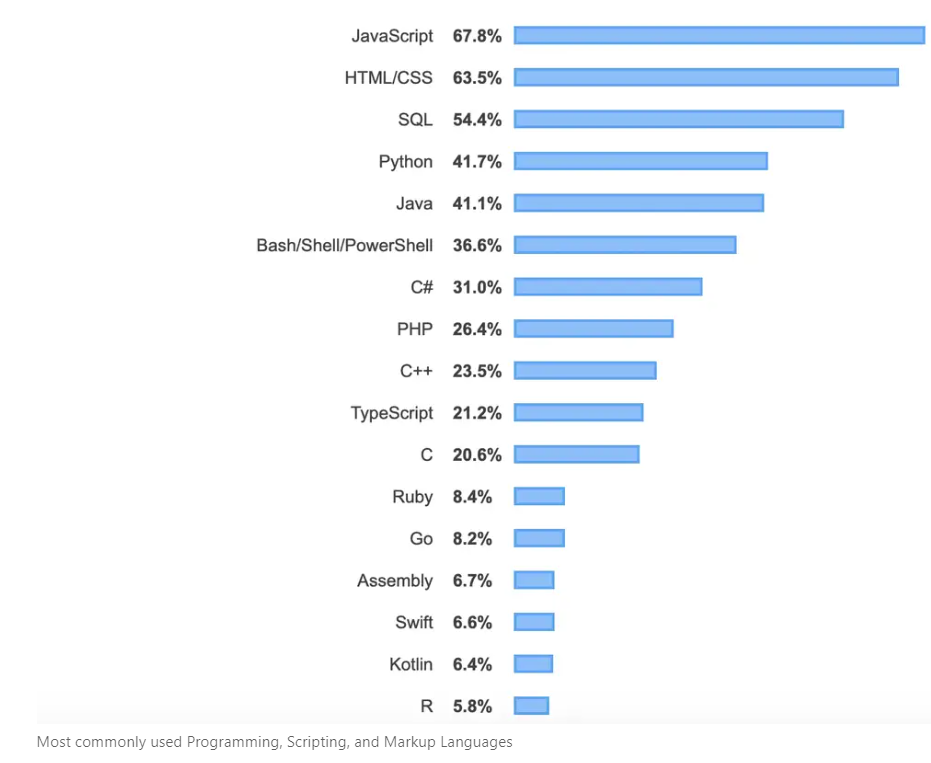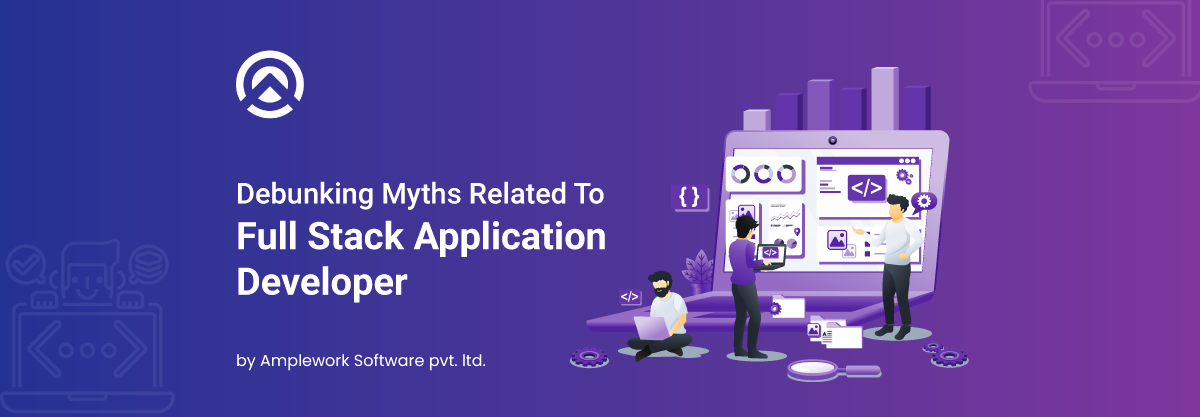In reality, it is important to understand that when you hire dedicated full stack developers you should be realistic in terms of expectations. For example: when you assigned a task to full-stack developers then do not expect fast turnaround on complex tasks. As, proper time management and realistic deadlines are crucial for successful project completion. Another reality of the market is that many developers try to sell themselves as full stack developer myths. In such a case, it entirely depends upon the interviewer how they want to test the skills or what method they adopt to test the skills? So, in this blog, we have decided to cover the top myths which are associated with full-stack developers.
Apart from this, according to Stack Overflow, there are some commonly used programming languages, scripting and markup languages.
 Source: StackOverflow
Source: StackOverflow
In this blog , there will be a discussion about the top myths associated with full-stack developers. As, clearing out these myths will help you to hire reliable full-stack developers in the market.
Top Myths Associated With Full-Stack Developers
In the market, the demand for full-stack developers is on the rise because there is a considerable requirement for these developers to handle complete IT products. Companies often rely on full-stack developers for sharing their valuable input & knowledge on IT solutions. So, when you decide to hire full stack web developers then keep the below aspect in your mind:
1. A Full-Stack Developer Should Be An Expert Coder
A full stack developer shouldn’t ideally produce any code at all. He needs to be able to convey his technical visions to top and middle management like a systems architect can. This is so that issues may identify integration-related problems and discrepancies before they occur.
Therefore, anyone who believes a full-stack developer will also be a skilled programmer is erroneous. A company that provides also affordable full stack development services provides a guarantee for completing the coding part with all the necessary tech-driven solutions.
2. Only 1 Full-Stack Developer is Enough For All Projects
You must include them if your project’s requirements suggest that you must recruit a full-stack developer. Therefore, you can hire them separately if your project depends entirely on either the front end or the back end.
You may be considering whether projects can be done with individual developers rather than hiring full-stack coders after reading far. The short answer is “no,” since full-stack programmers manage full coordination of work across every stage, and you cannot run all projects without experts.
Only projects that have either front-end or back-end focus can be handled without full-stack developers. So, you need to check out the project requirements for managing whether your project requires full-stack developers or your project can be run through individual experts?
3. A Full-Stack Developer is an Expert in All Technologiiecal Trades
A full-stack developer’s skill set is limitless. He needs to be fully educated about every section of the stack. A thorough knowledge of an application’s front- and back-end systems is necessary for full-stack development. He’ll be amazing at fusing the two together and converting a visual concept into an Minimum Viable Product.
Yet he will undoubtedly possess an extensive set of skills that includes project management, system integration, front-end computer programming and back-end development. However, in most cases, it is not possible that a full stack developer should be an expert in all technological trades to handle operations.
They are aware of the working aspects of technologies but they are not experts in all the technologies. Each full-stack developer has their own expertise in a different set of technologies.
4. Software Engineers Are Equivalent To Full Stack Developers
Here are a few differentiating factors:
1. Focus: Software engineers typically specialize in a specific area of software development, such as backend systems or frontend user interfaces, whereas full stack developers have a broader focus, working on both frontend and backend components.
2. Depth of Knowledge: Software engineers often possess a deeper understanding of specialized areas within software development, such as algorithms, performance optimization, or data modeling. Full stack developers, while having a solid grasp of multiple technologies, may not have the same level of expertise in specialized domains.
3. Project Scope: Software engineers often work on large-scale projects that require extensive planning, collaboration, and coordination with diverse teams.
5. All Professional Full Stack Developers Process the Same Traits
The most sought-after developers are full-stack experts. They’re also, in some respects, the most understood. There is a misconception that full-stack developers all conduct the same tasks and have the same set of capabilities.
You can connect with a full stack development agency for getting reliable services. It will support you in leveraging your business growth with the latest tech solutions. You can connect with the top 10 full stack development companies.
There are a vast number of associated questions that you should ask full-stack developers. However, we have covered a few sets of questions that will help you to test technical skills, their experience, questions related to continuous learning, etc.
Testing Technical Skills
- What programming languages, frameworks, and technologies are you proficient in?
- Can you describe your experience with front-end development (HTML, CSS, JavaScript, etc.)?
- What back-end technologies have you worked with (Node.js, Ruby on Rails, Django, etc.)?
- Have you worked with any specific databases (MySQL, PostgreSQL, MongoDB, etc.)?
Testing Their Full-Stack Development Experience
- Can you describe your experience in developing full-stack applications from start to finish?
- Have you worked on projects that involved integrating front-end and back-end systems? Could you explain how you approached it?
- What methodologies and tools do you use for version control and project management?
Questions for Testing Problem-solving and debugging
- How do you approach identifying and fixing bugs or issues in your code?
- Can you share an example of a challenging technical problem you encountered and how you resolved it?
- How do you ensure the performance and security of your applications?
Testing Collaboration & Teamwork
- Have you worked in a team environment before? How did you contribute to the team’s success?
- How do you handle disagreements or conflicts within a development team?
- Can you describe a time when you had to work closely with other team members (designers, backend developers, etc.)? How did you ensure effective collaboration?
Questions for Testing Continuous Learning & Adaptability
- How do you stay updated with the latest trends and advancements in full-stack development?
- Can you provide an example of a time when you had to quickly learn a new technology or framework for a project?
- How do you handle changes in project requirements or shifting priorities?
Questions for Testing Communication & Client Interaction
- How did you handle them?
- How do you explain technical concepts to non-technical stakeholders or clients?
- Can you describe a situation where you had to manage client expectations effectively?
These questions can help you evaluate a full-stack developer’s technical proficiency, problem-solving abilities, teamwork skills, adaptability, and communication capabilities. It’s also essential to tailor the questions to your specific project requirements and organizational needs. Apart from this, you can empower yourself to know about the top 7 associated myths.
The Final Words
With the proper approach and trusted partners, you can hire affordable full stack developers who process a wide range of expertise. For the budgeted approach, you can choose to hire remote full-stack developers as it is highly cost-effective as compared to hiring in-house developers.
So, if you have any project ideas then you can connect with full-stack developers to scale your business effectively. You can even implement new tools and technologies with the help of these developers.
At Amplework, we have prowess developers with an average experience of 5+ years. We are known in the industry for delivering reliable and trusted solutions. We’re ISO certified organization and till now our clients generated more than 200M+ in revenues with our tech solutions.










